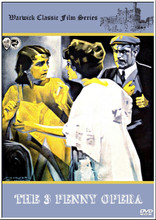 Loading... Please wait...
Loading... Please wait...New Products
Our Newsletter
Product Description
The 3 Penny Opera (1931)
Director:
Georg Wilhelm Pabst (as G.W. Pabst)Writers:
Bertolt Brecht (text by) (as Brecht) , Béla Balázs(adaptation) (as Balazs)Stars:
Rudolf Forster, Lotte Lenya, Carola NeherFilmmaker G.W. Pabst's adaptation of Bertoldt Brecht and Kurt Weill's Threepenny Opera (Die Dreisgoschenoper) is every bit as good as the stage original, and sometimes even better. Filmed in both German and French versions with different casts (a planned English-language version was abandoned), Threepenny is most readily available today in its German incarnation. Rudolf Forster stars as robber captain MacHeath -- aka Mackie Messer, or Mack the Knife -- who falls in love with Polly (Carola Neher), daughter of beggar king Peachum (Fritz Rasp). Despising MacHeath, Peachum plots the thief's downfall with his best friend, corrupt police official Tiger Brown (Reinhold Schunzel). The satirical "happy ending" of the original -- MacHeath, en route to the gallows, suddenly and without motivation promoted to knighthood! -- is altered somewhat by Pabst and his scenarists to accommodate a swipe against Depression-era bankers. Lotte Lenya, Weill's wife, brilliantly repeats her stage role as Pirate Jenny. Stylistically, Threepenny Opera is a Georg Grosz drawing come to life; despite its 1890s London setting, the film's calculatedly tawdry veneer is clearly meant to represent the wide-open Berlin of the 1930s. For the record: the French version of Threepenny Opera starred Albert Prejean as MacHeath.
Currency Converter
Choose a currency below to display product prices in the selected currency.


















